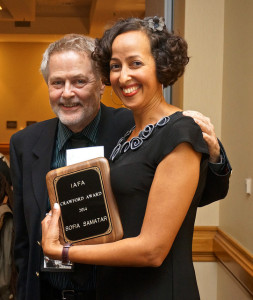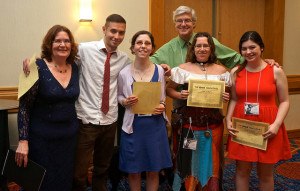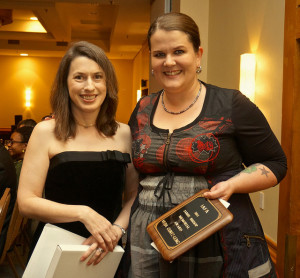At Continuum X, 6-9 June 2014, the following were the winners and runners-up of the annual Australian SF Awards (Ditmars). Winners in each category are in bold.
Best Novel
Ink Black Magic, Tansy Rayner Roberts (FableCroft Publishing)
Fragments of a Broken Land: Valarl Undead, Robert Hood (Wildside
Press)
The Beckoning, Paul Collins (Damnation Books)
Trucksong, Andrew Macrae (Twelfth Planet Press)
The Only Game in the Galaxy (The Maximus Black Files 3), Paul Collins (Ford Street Publishing)
Best Novella or Novelette
“Prickle Moon”, Juliet Marillier, in Prickle Moon (Ticonderoga
Publications)
“The Year of Ancient Ghosts”, Kim Wilkins, in The Year of Ancient
Ghosts (Ticonderoga Publications)
“By Bone-Light”, Juliet Marillier, in Prickle Moon (Ticonderoga
Publications)
“The Home for Broken Dolls”, Kirstyn McDermott, in Caution:
Contains Small Parts (Twelfth Planet Press)
“What Amanda Wants”, Kirstyn McDermott, in Caution: Contains Small
Parts (Twelfth Planet Press)
Best Short Story
“Mah Song”, Joanne Anderton, in The Bone Chime Song and Other
Stories (FableCroft Publishing)
“Air, Water and the Grove”, Kaaron Warren, in The Lowest Heaven
(Jurassic London)
“Seven Days in Paris”, Thoraiya Dyer, in Asymmetry (Twelfth Planet
Press)
“Scarp”, Cat Sparks, in The Bride Price (Ticonderoga Publications)
“Not the Worst of Sins”, Alan Baxter, in Beneath Ceaseless Skies 133
(Firkin Press)
“Cold White Daughter”, Tansy Rayner Roberts, in One Small Step
(FableCroft Publishing)
Best Collected Work
The Back of the Back of Beyond, Edwina Harvey, edited by Simon
Petrie (Peggy Bright Books)
Asymmetry , Thoraiya Dyer, edited by Alisa Krasnostein (Twelfth
Planet Press)
Caution: Contains Small Parts, Kirstyn McDermott, edited by Alisa
Krasnostein (Twelfth Planet Press)
The Bone Chime Song and Other Stories, Joanne Anderton, edited by
Tehani Wesseley (FableCroft Publishing)
The Bride Price, Cat Sparks, edited by Russell B. Farr
(Ticonderoga Publications)
Best Artwork
Cover art, Eleanor Clarke, for The Back of the Back of Beyond by
Edwina Harvey (Peggy Bright Books)
Illustrations, Kathleen Jennings, for Eclipse Online (Nightshade
Books)
Cover art, Shauna O’Meara, for Next, edited by Simon Petrie and Rob
Porteous (CSFG Publishing)
Cover art, Cat Sparks, for The Bride Price by Cat Sparks
(Ticonderoga Publications)
Rules of Summer, Shaun Tan (Hachette Australia)
Cover art, Pia Ravenari, for Prickle Moon by Juliet Marillier
(Ticonderoga Publications)
Best Fan Writer
Tsana Dolichva, for body of work, including reviews and interviews
in Tsana’s Reads and Reviews
Sean Wright, for body of work, including reviews in Adventures of
a Bookonaut
Grant Watson, for body of work, including reviews in The Angriest
Foz Meadows, for body of work, including reviews in Shattersnipe:
Malcontent & Rainbows
Alexandra Pierce, for body of work, including reviews in Randomly
Yours, Alex
Tansy Rayner Roberts, for body of work, including essays and reviews
at www.tansyrr.com
Best Fan Artist
Nalini Haynes, for body of work, including “Defender of the Faith”,
“The Suck Fairy”, “Doctor Who vampire” and “The Last Cyberman” in Dark
Matter
Kathleen Jennings, for body of work, including “Illustration
Friday”
Dick Jenssen, for body of work, including cover art for Interstellar
Ramjet Scoop and SF Commentary
Best Fan Publication in Any Medium
Dark Matter Zine, Nalini Haynes
SF Commentary, Bruce Gillespie
The Writer and the Critic, Kirstyn McDermott and Ian Mond
Galactic Chat Podcast, Sean Wright, Alex Pierce, Helen Stubbs,
David McDonald, and Mark Webb
The Coode Street Podcast, Gary K. Wolfe and Jonathan Strahan
Galactic Suburbia, Alisa Krasnostein, Alex Pierce, and Tansy Rayner
Roberts
Best New Talent
Michelle Goldsmith
Zena Shapter
Faith Mudge
Jo Spurrier
Stacey Larner
William Atheling Jr Award for Criticism or Review
Reviews in Randomly Yours, Alex, Alexandra Pierce
“Things Invisible: Human and Ab-Human in Two of Hodgson’s Carnacki
stories”, Leigh Blackmore, in Sargasso: The Journal of William Hope Hodgson
Studies #1 edited by Sam Gafford (Ulthar Press)
Galactic Suburbia Episode 87: Saga Spoilerific Book Club, Alisa
Krasnostein, Alex Pierce, and Tansy Rayner Roberts
The Reviewing New Who series, David McDonald, Tansy Rayner
Roberts, and Tehani Wessely
“A Puppet’s Parody of Joy: Dolls, Puppets and Mannikins as
Diabolical Other”, Leigh Blackmore, in Ramsey Campbell: Critical Essays on
the Master of Modern Horror edited by Gary William Crawford (Scarecrow
Press)
“That was then, this is now: how my perceptions have changed”,
George Ivanoff, in Doctor Who and Race edited by Lindy Orthia (Intellect
Books)


